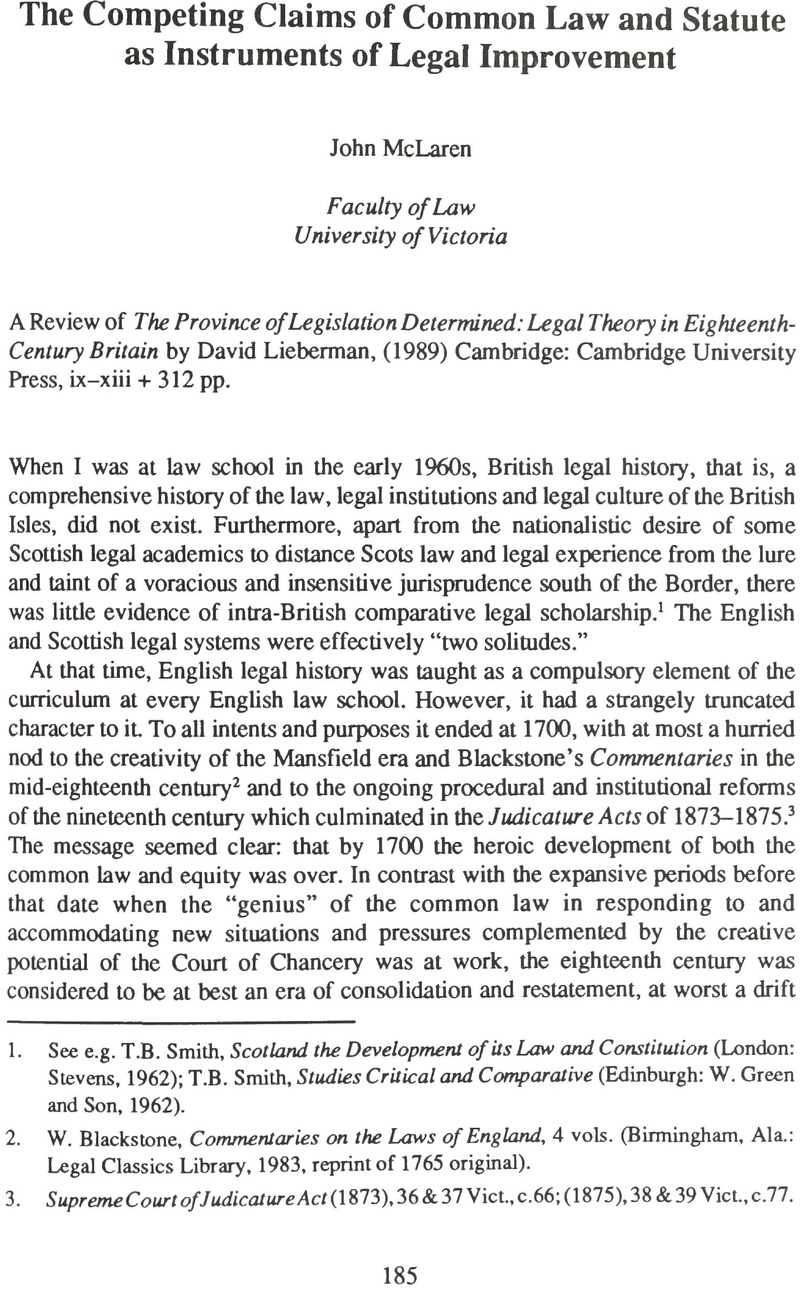No CrossRef data available.
Published online by Cambridge University Press: 18 July 2014

1. See e.g. Smith, T.B., Scotland the Development of its Law and Constitution (London: Stevens, 1962)Google Scholar; Smith, T.B., Studies Critical and Comparative (Edinburgh: W. Green and Son, 1962)Google Scholar.
2. Blackstone, W., Commentaries on the Laws of England, 4 vols. (Birmingham, Ala.: Legal Classics Library, 1983, reprint of 1765 original)Google Scholar.
3. Supreme Court of Judicature Act (1873), 36 & 37Google Scholar Vict., c.66; (1875), 38 & 39 Vict., c.77.
4. See Atiyah, P., The Rise and Fall of Freedom of Contract (Oxford: Oxford University Press, 1979)Google Scholar; Beattie, J., Crime and Courts in England 1550–1800 (Princeton: Princeton University Press, 1986)Google Scholar; Brewer, J. and Styles, J., eds., An Ungovernable People: The English and Their Law in the Seventeenth and Eighteenth Centuries (New Brunswick, N.J.: Rutgers University Press, 1980)Google Scholar; Cockburn, L., ed., Crime in England 1550–1880 (Princeton: Princeton University Press, 1977)Google Scholar; Cornish, W. and Clark, G., Law and Society in England 1750–1950 (London: Sweet and Maxwell, 1989)Google Scholar; Hay, D. et al. , Albion's Fatal Tree: Crime and Society in Eighteenth Century England (Harmondsworth: Penguin, 1975)Google Scholar; Manchester, A., A Modern Legal History of England and Wales 1750–1950 (London: Butterworths, 1980)Google Scholar; Rubin, G. and Sugarman, D., Law, Economy and Society: Essays in the History ofEnglish Law 1750–1914 (London: Professional Books, 1984)Google Scholar; Thompson, E., Whigs and Hunters: The Origin of the Black Act (Harmondsworth: Peregrine, 1975)Google Scholar.
5. See e.g. Friedman, L., A History of American Law (New York: Touchstone Books, 1973)Google Scholar; Horowitz, M., The Transformation of American Law (Cambridge: Harvard University Press, 1977)Google Scholar.
6. See Flaherty, D., ed., Essays in the History of Canadian Law, vols. 1 and 2 (Toronto: Osgoode Society, 1981, 1983)Google Scholar; Girard, P. and Phillips, J., eds., Essays in the History of Canadian Law, vol. 3 (Toronto: Osgoode Society, 1990)CrossRefGoogle Scholar; Pue, W. and Wright, B., eds., Canadian Perspectives on Law and Society: Issues in Canadian Legal History (Ottawa: Carleton University Press, 1988)CrossRefGoogle Scholar; Knafla, L., ed., Law and Justice in a New Land: Essays in Western Canadian Legal History (Calgary: Carswell, 1987)Google Scholar.
7. See e.g. Sugarman, D., ed., Legality, Ideology and the State (London: Academic Press, 1983)Google Scholar; Devlin, R., ed., Critical Legal Studies (Toronto: Emond Montgomery, 1991)Google Scholar; Devlin, R., ed., Feminist Legal Theory (Toronto: Emond Montgomery, 1991)Google Scholar.
8. See e.g. H. Summerson, “The Early Development of the Laws of the Anglo-Scottish Marches, 1249-1448” and Sellar, D., “Forethocht Felony, Malice Aforethought and the Classification of Homicide” in Gordon, W. and Fergus, T., eds., Legal History in the Making: Proceedings of the Ninth British Legal History Conference, Glasgow, 1989 (London: Hambledon Press, 1991) at 29–12 and 43–59 respectivelyGoogle Scholar.
9. Lieberman, D., The Province of Legislation Determined: Legal Theory in Eighteenth-Century Britain (Cambridge: Cambridge University Press, 1989)CrossRefGoogle Scholar.
10. Ibid. at 1–13.
11. See especially Pocock, J., The Machiavellian Moment: Florentine Political Thought and the Atlantic Republican Tradition (Princeton: Princeton University Press, 1975)Google Scholar; Pocock, J., Virtue, Commerce and History: Essays on Political Thought and History in the Eighteenth Century (Cambridge: Cambridge University Press, 1985)CrossRefGoogle Scholar.
12. Stephen, L., History of English Thought in the Eighteenth Century (1876), 2 vols. (New York: Harcourt Brace, 1962)Google Scholar.
13. “Dr. Bonham's Case” (1610), 8 Co. Rep. 114.
14. Blackstone, supra, note 2, vol. 1 at 8–13.
15. Barrington, D., Observations on the More Ancient Statutes … with an Appendix being a proposal for modelling the Statutes, 3rd ed. (London: W. Bowyer and J. Nicholls, 1766)Google Scholar.
16. Burn, R., The History of the Poor Laws with Observations (1764) (Clifton, N.J.: Kelley, 1973, reprint of original)Google Scholar.
17. Hargrave, F., A Collection of Tracts Relative to the Law of England (London: E. Lynch, 1787)Google Scholar. This compendium included the hitherto unpublished “Considerations touching the Amendment of Alteration of Laws” of Sir Matthew Hale, the seventeenth-century judge and jurist.
18. Beccaria, C., An Essay on Crimes and Punishments, trans, from the Italian (1767) (Brookline Village, Mass: Branden Press, 1983, reprint of 3rd ed., 1770)Google Scholar
19. Bentham, J., An Introduction to Principles of Morals and Legislation (1789), Burns, J. and Hart, H., eds. (London: Athlone, 1970)CrossRefGoogle Scholar.
20. See Arthurs, H., ‘Without the Law’: Administrative Justice and Legal Pluralism in Nineteenth Century England (Toronto: University of Toronto Press, 1985)Google Scholar.
21. Lieberman at 287—“It was only the adoption of the controversial Benthamic premise that legal modernization in England had to operate exclusively through parliamentary statute which transformed these complex alternative strategies into ‘an antipathy to reformation.’”
22. See Steintrager, J., Bentham (Ithaca, N.Y.: Cornell University Press, 1977)Google Scholar; Roberts, D., Victorian Origins of the Welfare State (Hamden, Conn.: Archon Books, 1960)Google Scholar.